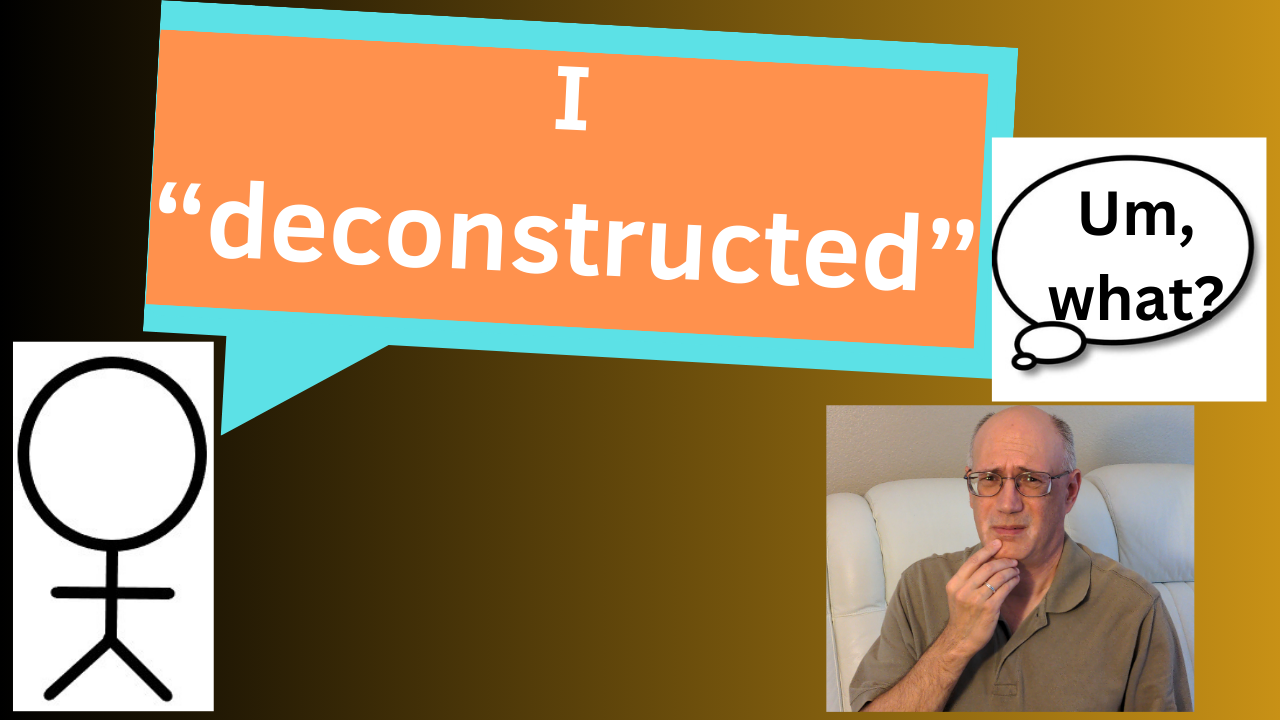10/11/2023 – I Deconstructed?

When religious people say “I deconstructed” what does that mean? What is the relationship to that and the original development of deconstruction in philosophy? I have a few things to say about that. Let the rant begin. I’m not really that mad. I just want to talk about it. Check this out. This is TenOnReligion.
Hey peeps, it’s Dr. B. with TenOnReligion. If you like religion and philosophy content one thing I really need you to do is to smash that sub button because it really helps out the channel. The transcripts are available at TenOnReligion.com and new episodes are posted about every two weeks, around noon, U.S. Pacific time, so drop me some views.
By the way, I’ve got my glasses on today which means I’m “smart” Dr. B.
There seems to be a lot of confusion regarding the word “deconstruction,” especially as it relates to religion. It’s used on social media as some sort of an action as someone recently posted “you can deconstruct and still have a thriving faith.” Yet not everyone fully understands this kind of usage like this poster who asked what does deconstruction mean. “I googled it and I still don’t understand.” It’s like it’s some sort of way of describing the idea that one comes to a point of not accepting everything they’ve been taught regarding religion or a specific way of interpreting and/or living that religion. I’m not sure how deconstruction recently came to mean this sort of thing because that’s not exactly what deconstruction is philosophically. So, I first want to start there and talk about what deconstruction originally meant, and then address some of the contemporary concerns about what people really mean when they use this term, and then provide a little bit of an explanation to better understand the issue. Let’s get started.
The idea of deconstruction in philosophy originated in a wider context of postmodernism. A probably oversimplified definition of postmodernism is the idea of skepticism toward those metanarratives that seek to legitimate the exercise of political power controlling what and how we know things. This upset the apple cart of structuralism at the time in which the way we understand things are all connected to a structure of relations within any given culture which was logical and stable. Well, certain folks started to question this and believed that the interpretive structure of understanding things was actually influenced by other systems of power that we often are largely unaware of or oblivious to. This reminds me of an Agent Smith quote in the original Matrix film, “Billions of people, just living out their lives…oblivious.” This is post-structuralism – the idea that meanings aren’t as fixed as we think they are but are rather heavily influenced by power, or more precisely, those in power. Most of you can probably already see how religion fits into this picture, but hang on a second. Derrida enters the scene and develops the idea of deconstruction. This was a philosophy trying to explain how we use language. There is no such thing as “out of the context.” Meanings of words and signs are always in flux and change when the context changes. The meaning is always deferred. A sign is never fixed as “itself” but is perpetuated through time in different ways based on different contexts. The only thing we can do is try and discover why certain decisions were made regarding meaning. For example, when I was born the highest point in the United States was Mt. McKinley, named after a presidential candidate in 1896, and now it’s Denali. Obviously, the mountain is the same, so what changed? In 2015, The powers that be, or political leaders, decided to change the name back to Denali, one of several local indigenous-language names for the mountain. Now, what if, instead of talking about a mountain in Alaska, one starts talking about an important religious figure, or religious practice, or a religious text? I’m glad you asked that question.
So, let’s think about this for a second. When religious adherents say “I deconstructed” the hearer immediately assumes there was some sort of a construction which preceded the deconstruction. The construction is the building up of a religious knowledge and belief system by which one interprets a great many things ranging from morality – what’s right and what’s wrong – to how the universe was created. The “deconstruction” is then apparently the dismantling of some or all of that religious knowledge and belief system. The catalyst is often something that causes cognitive dissonance. From the psychological perspective, when the human mind understands something, it has to make sense. When confronted with something new that challenges what one already believes or thinks about reality, one obviously has to make a choice. Either reject the thing that challenges what one believes, or accept it and change one’s beliefs. There are many examples in religion. Like if you’re taught people with a certain lifestyle or religion are wrong or bad or evil or something like that, but then you meet and get to know one of them and realize they’re actually just a normal, loving, kind, and fun person just like you are. Or, one might hold on to a literal understanding of their respective scriptures, like the Hebrew Bible, New Testament, or Qur’an because they come from God. But as one further studies in depth when, why, and how the documents that comprise these larger compilations were actually produced and collected, they end up realizing that the “scriptures” are a lot more human than divine. The Christian New Testament scholar Rudolf Bultman refers to this process as a demythologization in the way we interpret and understand religious texts, in his case the New Testament. Paul Tillich, another religious scholar, critiqued Bultmann and referred to this not as a demythologization, but a deliteralization. The myth never really goes away. It just gets transformed into another myth – another way of interpreting and understanding reality. Religious figures like Abraham and Moses or even Jesus have had different interpretative meanings emphasized based on time periods and cultures, and any given meanings assigned to them today are quite varied and are based on one’s upbringing and education. But is this deconstruction? Somehow, I don’t think this is what Derrida was talking about when he developed philosophical deconstruction. When one “deconstructs” they aren’t really stating that the meaning is always deferred, because it does mean “something” to them. So, let me provide a model to help us understand this situation a little bit better.
We are constantly changing our understanding of the world including our views regarding religion, regardless of whether or not one identifies with any religious tradition. This is based on the socialization process of our upbringing and what we are exposed to. The philosopher Gadamer referred to this as constantly expanding our horizon and cites Heidegger’s hermeneutical circle of understanding. Unless something triggers a question, no change will occur in one’s mindset. If a question does arise, the process begins. One does not always have to follow their tradition when faced with a choice. There are choices, but the choices are limited by working out the possibilities. We make a projection, or hypothesis, based on our previous experiences and knowledge. It starts with what is already there in one’s present horizon. The pattern goes from understanding to interpretation and back to understanding, repeating itself again and again disclosing meaning which fills in our belief system. When we are confronted with an idea or person which conflicts with what we already know – our present horizon – we begin a dialogue with that idea or person. The more open we are, the more productive the dialogue.
So, when religious adherents say they “deconstructed” this only seems to mean they are rejecting certain views or beliefs which were previously dominant in their socialization process or upbringing and now they are changing them. In the words of the religious scholar Raimon Panikkar, they are undergoing a process of transmythicization – changing from one myth to another. We all believe in something, a combined interpretation of religion, science, or philosophy, and that’s our myth – our way of understanding the world. All religions are full of various symbols and they are often rightly criticized on the basis of their power to express what they are supposed to express. When religious people “deconstruct” they come to a realization that certain symbols represent the political will and power of humans rather than an analysis of the human predicament. All faith assumes some risk. Doubt is not the opposite of faith but an element of faith. The risk of faith is affirming a wrong interpretation of a symbol that does not express something ultimate. Neither the cultural nor the mythological expressions of faith are meaningful if their symbolic character is not understood. Buttttt…symbols lose their power when they no longer “say” anything anymore, meaning the symbols become too literal and thus become broken. Things like wars, crusades, nationalism, and jihads are human political manipulations or contortions of religion which corrupt religion. The same goes for other things like slavery, or harassment or abuse of women in the name of religion. When a person has a negative experience with religion it can lead to an outright rejection of that particular religion, or even all religion altogether. All religious communities have some level of religious corruption in them because of the human factor, but there are communities in which the level of corruption is minimized. There are communities in which one can have more positive experiences with religion than negative ones.
So, is this recent religious pop-culture usage of the term “deconstruction” the same as what Derrida was talking about when he introduced the philosophical concept of deconstruction? When they say “I deconstructed” do they mean that the meanings of various religious symbols are always deferred? Probably not, but perhaps there is some connection. Religious adherents who “deconstruct” are changing contexts and the new contexts change the meaning of religious words, ideas, and symbols so maybe there’s a similarity there. One thing is certain, however, and that is a deconstruction is always a reconstruction. It’s always a changing from one myth to another, or one interpretation of understanding to another interpretation of understanding. When we say or label a religious belief as “wrong” we are simply assigning a value judgement because it conflicts with our current interpretation or understanding.
So, what do you think about all of this? Have you or someone you know “deconstructed”? Do you think religious “deconstruction” is the same as Derrida’s philosophical deconstruction? Leave a comment below and let me know what you think. Until next time, stay curious. If you enjoyed this, support the channel in the link below, please like and share this video and subscribe to this channel. This is TenOnReligion.


